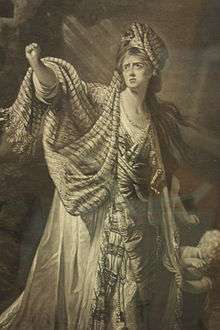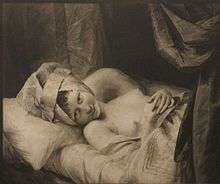William Dickinson (engraver)

William Dickinson (1746–1823) was an English mezzotint engraver.
Life
He was born in London. Early in life he began to engrave in mezzotint, mostly caricatures and portraits after Robert Edge Pine, and in 1767 he was awarded a premium by the Society of Arts. In 1773 he commenced publishing his own works, and in 1778 went into partnership with Thomas Watson, who engraved in both stipple and mezzotint, and who died in 1781.[1]
Dickinson appears to have been still carrying on the business of a printseller in 1791, but he later moved to Paris, where he continued to engrave, and died in the summer of 1823. [1]
Works

John Chaloner Smith in his British Mezzotinto Portraits described 96 plates by Dickinson. His major works were portraits, in particular those after Sir Joshua Reynolds.[2] He also engraved portraits of:[1]
- John, duke of Argyll, after Thomas Gainsborough;
- Lord-chancellor Thurlow (full-length), Admiral Lord Keppel, Thomas, lord Grantham, Sir Charles Hardy, Dr. Law, bishop of Carlisle, Isaac Reed, and Miss Ramus (afterwards Lady Day), after George Romney;
- George II (full-length), Ferdinand, Duke of Brunswick, David Garrick, Miss Nailer as "Hebe", Mrs. Yates (full-length), John Wilkes (two plates), and James Worsdale, after Robert Edge Pine;
- Richard, first earl Grosvenor (full-length), after Benjamin West;
- the Duke and Duchess of York (two full-lengths), after John Hoppner;
- Mrs. Siddons as "Isabella" (full-length), after Thomas Beach;
- Charles, 2nd Earl Grey, and William, Lord Auckland, after Sir Thomas Lawrence;
- Samuel Wesley when a boy (full-length), after John Russell;
- Mrs. Gwynne and Mrs. Bunbury as the "Merry Wives of Windsor", after Daniel Gardner;
- Sir Robert Peel, after James Northcote;
- Charles Bannister, after W. C. Lindsay;
- Mrs. Hartley as "Elfrida", after James Nixon;
- Napoleon I, after Gérard (1815);
- Catharine, Empress of Russia; and
- others after Angelica Kauffman, Nathaniel Dance, Wheatley, Gainsborough Dupont, George Stubbs, and Morland.

This is the mould of which I made the Sex
I gave them but one Tongue to say us Nay,
And two kind Eyes to grant.
Besides these he engraved a "Holy Family", after Correggio; heads of Rubens, Helena Forman (Rubens's second wife), and Anthony van Dyck, after Rubens; "The Gardens of Carlton House, with Neapolitan Ballad-singers", after Henry William Bunbury; "The Murder of David Rizzio" and "Margaret of Anjou a Prisoner before Edward IV", after John Graham; "Lydia"," after Matthew William Peters; and "Vertumnus and Pomona" and "Madness", after Pine, some of which are in the dotted style.[1] One of his most famous engravings was of Henry William Bunbury's A Long Minuet as Danced at Bath, which he published in 1787 and which measured around seven feet (over two metres) in length.
Notes
- 1 2 3 4
 Stephen, Leslie, ed. (1888). "Dickinson, William (1746-1823)". Dictionary of National Biography. 15. London: Smith, Elder & Co.
Stephen, Leslie, ed. (1888). "Dickinson, William (1746-1823)". Dictionary of National Biography. 15. London: Smith, Elder & Co. - ↑ They include full-length portraits of George III in his coronation robes, Charles, duke of Rutland, Elizabeth, countess of Derby, Diana, viscountess Crosbie, Mrs. Sheridan as ‘St. Cecilia,’ Mrs. Pelham, Mrs. Mathew, Lord Robert Manners, and Richard Barwell and son; and three-quarter or half-length portraits of Jane, duchess of Gordon, Emilia, duchess of Leinster, Lady Charles Spencer, Lady Taylor, Richard, earl Temple, Admiral Lord Rodney, Sir Joseph Banks, Dr. Percy, bishop of Dromore, Soame Jenyns, and the Hon. Richard Edgcumbe.
- ↑ Rhode Island School of Design. Museum of Art (1991). European Painting and Sculpture, Ca. 1770-1937, in the Museum of Art, Rhode Island School of Design. University of Pennsylvania Press. pp. 34–. ISBN 978-0-911517-55-2. Retrieved 21 August 2013.
| Wikimedia Commons has media related to William Dickinson. |
- Attribution
![]() This article incorporates text from a publication now in the public domain: Stephen, Leslie, ed. (1888). "Dickinson, William (1746-1823)". Dictionary of National Biography. 15. London: Smith, Elder & Co.
This article incorporates text from a publication now in the public domain: Stephen, Leslie, ed. (1888). "Dickinson, William (1746-1823)". Dictionary of National Biography. 15. London: Smith, Elder & Co.